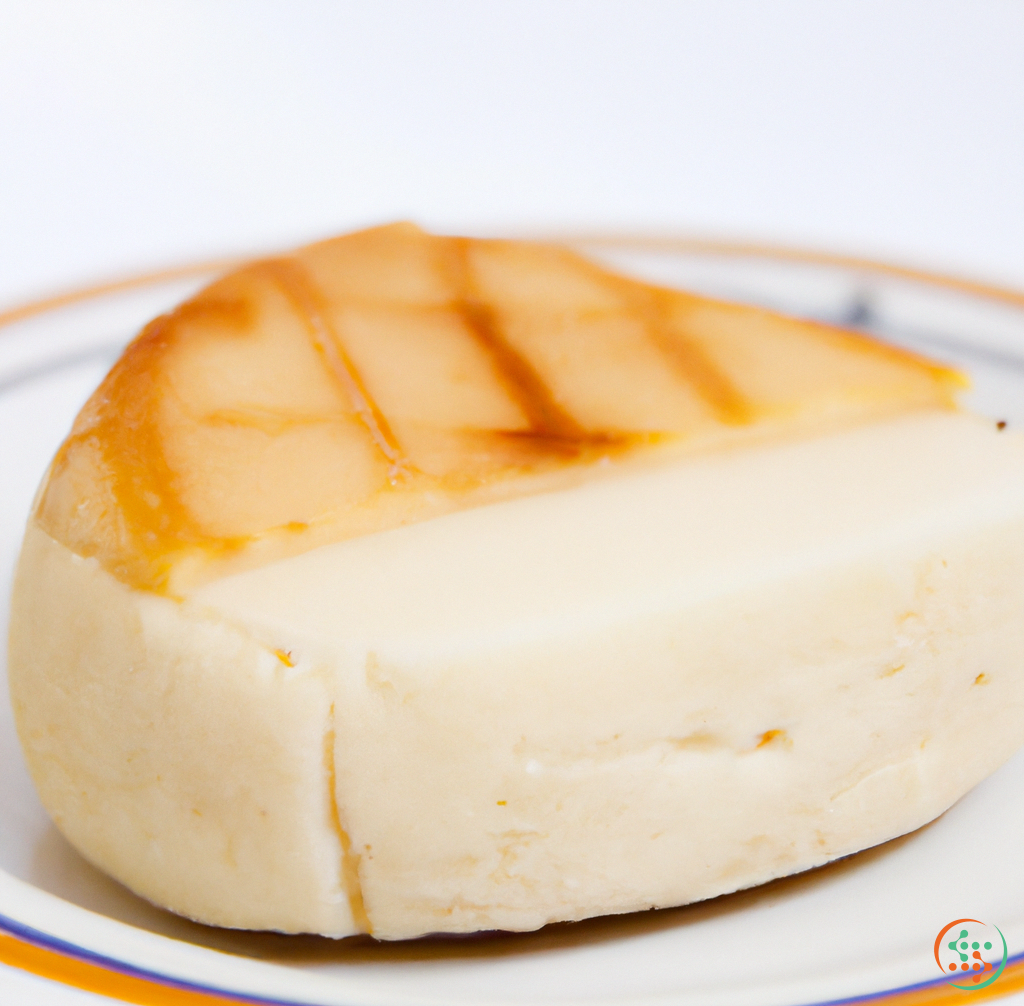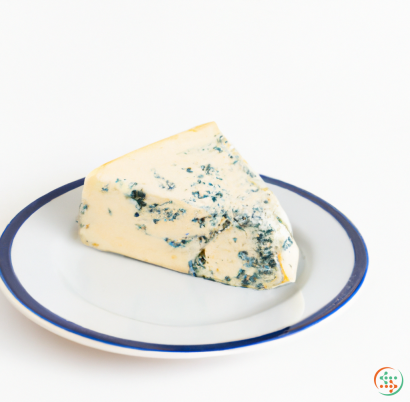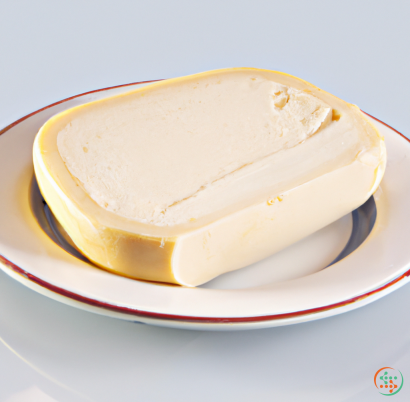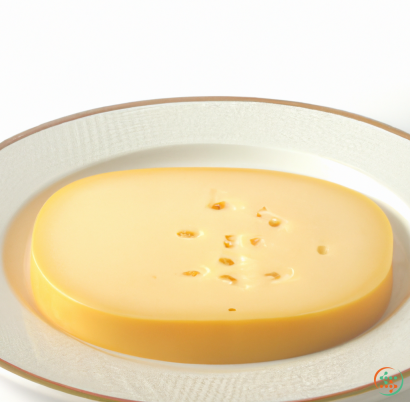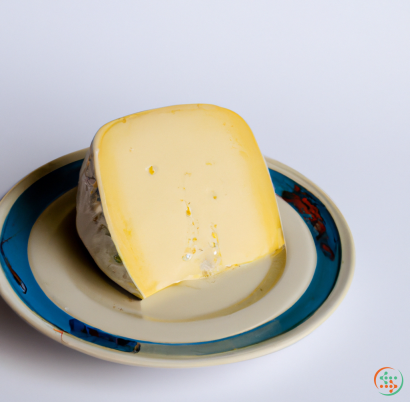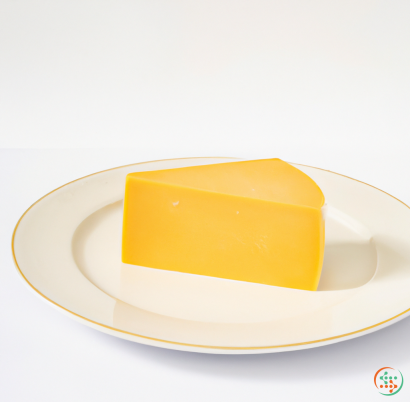Asadero Cheese
Asadero cheese is a type of semi-soft cheese originating from Mexico, which is known for its flavorful, slightly tangy taste and stringy texture. It is made from cow’s milk, and is named after the Mexican term “asado”, which translates to “roasted”, and typically has an aged, smoky flavor from being roasted over an open fire. Asadero cheese can be eaten fresh, and also used in a variety of recipes, including tacos, quesadillas, and even soup.
Asadero cheese is made using techniques that date back centuries, relying on artisanal methods such as a strict temperature control, aging process and salt brining. The first step in making Asadero cheese begins with curdling the milk using the natural bacteria in it. For this process, the milk is heated to around 88°F and cooled. Then, salt brine is added to further curdle the milk. The next step involves pressing, or molding the cheese into molds or blocks in order to expel liquid whey and obtain the desired shape and size. After that, the cheese is placed in a special tank of hot water, where it is allowed to age, allowing the proteins in the cheese to continue to develop. Finally, the cheese is put through its final stage, called the finishing touch, which involves roasting the cheese over an open fire and turning it frequently in order to develop the smoky flavor and chewy, stringy texture.
When it comes to flavor, Asadero cheese is often described as being mildly tangy and slightly salty. It is typically a mild cheese, which makes it a popular choice for those who might be looking for a cheese that is not overly strong. It pairs well with a variety of foods, including tacos, quesadillas, burritos, and even soup. The smoky flavor of the roasted cheese adds a unique complexity to many dishes that it is used in, making it a great addition to many meals.
Asadero cheese is widely available in many U.S. grocery stores, and can be found in both brick and block form. When it comes to storage, it is best to keep it tightly wrapped and in a refrigerator, as the cheese will continue to ripen as time goes on. The cheese should also be consumed within a few weeks of purchase, as it begins to lose its texture and flavor if allowed to sit uneaten for too long.
Overall, Asadero cheese is a unique semi-soft cheese that originates from Mexico. It is made using artisanal techniques that have been in use for centuries, and has a flavorful, slightly tangy, smoky taste and chewy, stringy texture that pairs well with a variety of dishes. It also stores well in a refrigerator and should be used within a few weeks for the best flavor and texture. With its versatile taste and texture, Asadero cheese is a great choice for those looking for an interesting and flavorful way to add something special to their meals.
Introduction
We often take for granted how our food comes to our table—from farm to delivery. But one food in particular, the beloved Asadero cheese, serves as an ambassador of Mexico’s artisan food traditions: the long and powerful story of Asadero cheese. From humble roots, this cheese has a long and proud heritage, and learning about how it’s made and shipped can give insight into its flavor, history, and cultural significance.
Exploring The History of Asadero Cheese
Asadero cheese is a semi-soft Mexican cheese widely enjoyed around the world that has been tracing its origins back to the 16th century. This cheese is made from the milk of various types of seasonal animals, including goats, cows, sheep, and sometimes even buffaloes. The milk is then carefully collected and heated, enabling curd formation. It’s during this time that natural bacteria and enzymes in the milk begin to transform the milk into cheese.
Unique to Asadero cheese is that it goes through an extensive aging process, which can take upward of two years! During this time, the cheese is placed in different ventilation chambers to facilitate the ripening process. During this procedure, artisans carefully inspect the cheese to monitor its consistency, flavor, and aroma.
It’s thanks to this lengthy process of careful aging and monitoring that gives Asadero cheese its distinct bold flavor that is perfect for melting. This cheese is excellent in quesadillas, grilled sandwiches, soups, and pasta dishes.
The Journey of Asadero Cheese
The journey of Asadero cheese to the dinner plate begins in the large cheese dairies in Mexico where it is produced and aged. Asadero cheese is traditionally made by cheese makers using traditional methods developed through generations. It is a skill that is passed down from generation to generation. These techniques ensure a consistent flavor and make it easy to recognize a cheese that has been crafted in this manner.
When the cheese is ready for harvest, it’s then packaged and placed into special refrigerators to maintain its freshness and quality. Then, the cheese is carefully shipped by truck or train to a distribution center in the US where it can be packaged for shipping or sold in bulk to distributors.
From here, the cheese is aging further and maturing, giving it its unique flavor and texture. The cheese is also lightly salted after this period of maturation and aging. After packaging and labeling, Asadero cheese is then distributed to grocery stores around the world.
The Final Product
When you finally set the cheese on your dinner plate, Asadero cheese is sure to make a delicious addition to any culinary creation. Its unique flavor and texture make it perfect as a melting cheese on tacos and quesadillas, as well as a flavorful addition to lasagna, grilled cheese sandwiches, and paninis.
Its versatility has endeared Asadero cheese to food enthusiasts everywhere and has made it one of the most popular Mexican cheeses out there. It’s recently exploded in popularity thanks to its inclusion in omnichannel retailing and its inclusion in restaurant menus.
Conclusion
Asadero cheese is a Mexican cheese of great distinction. Its centuries-long process of production, maturation, and packaging ensure that when it reaches your dinner plate it is nothing short of perfection. With its smooth, creamy texture and powerful flavor, Asadero is a cheese that’s continuously growing in popularity and recognition. Whenever you see it, you can bet that you’re in for a delicious treat!
| Vitamin A | 0.055 mg | |
| Beta-Carotene | 0.004 mg | |
| Vitamin D | 0.5 ug | |
| Vitamin D3 | 0.5 ug | |
| Vitamin E | 0.24 mg | |
| Vitamin K | 0.0024 mg | |
| Vitamin B1 | 0.02 mg | |
| Vitamin B2 | 0.22 mg | |
| Vitamin B3 | 0.18 mg | |
| Vitamin B4 | 0.0154 grams | |
| Vitamin B5 | 0.23 mg | |
| Vitamin B6 | 0.05 mg | |
| Vitamin B9 | 0.008 mg | |
| Vitamin B12 | 0.001 mg |
| Calcium | 0.661 grams |
Daily Value 1.3 g
|
| Iron | 0.51 mg |
Daily Value 0.018 g
|
| Magnesium | 0.026 grams |
Daily Value 0.4 g
|
| Phosphorus | 0.443 grams |
Daily Value 1.25 g
|
| Potassium | 0.086 grams |
Daily Value 4.7 g
|
| Sodium | 0.705 grams |
Daily Value 2.3 g
|
| Zinc | 0.00302 grams |
Daily Value 0.011 g
|
| Copper | 0.03 mg |
Daily Value 0.9 mg
|
| Manganese | 0.04 mg |
Daily Value 0.0023 g
|
| Selenium | 0.0145 mg |
Daily Value 0.055 mg
|
| Tryptophan | 0.269 grams | |
| Threonine | 0.737 grams | |
| Isoleucine | 1.225 grams | |
| Leucine | 2.123 grams | |
| Lysine | 1.548 grams | |
| Methionine | 0.593 grams | |
| Cystine | 0.103 grams | |
| Phenylalanine | 1.19 grams | |
| Tyrosine | 1.061 grams | |
| Valine | 1.426 grams | |
| Arginine | 0.76 grams | |
| Histidine | 0.694 grams | |
| Alanine | 0.501 grams | |
| Aspartic Acid | 1.475 grams | |
| Glutamic Acid | 5.072 grams | |
| Glycine | 0.246 grams | |
| Proline | 2.403 grams | |
| Serine | 1.169 grams |
| Total Sugars | 2.9 grams |
per 100g
|
| Caproic acid (6:0) | 0.45 grams |
|
| Caprylic acid (8:0) | 0.24 grams |
|
| Capric acid (10:0) | 0.53 grams |
|
| Lauric acid (12:0) | 0.48 grams |
|
| Myristic acid (14:0) | 2.97 grams |
|
| Palmitic acid (16:0) | 8.8 grams |
|
| Stearic acid (18:0) | 3.62 grams |
|
| Butyric acid (4:0) | 0.86 grams |
|
| Total Saturated fatty acids: | 17.95 g | |
| Oleic acid (18:1) | 7.14 grams |
|
| Palmitoleic acid (16:1) | 0.9 grams |
|
| Total Monounsaturated fatty acids: | 8.04 g | |
| Linolenic acid (18:3) | 0.33 grams |
|
| Linoleic acid (18:2) | 0.52 grams |
|
| Total Polyunsaturated fatty acids: | 0.85 g | |
| Cholesterol | 0.11 grams |
|
| Total Sterols: | 0.11 g | |
